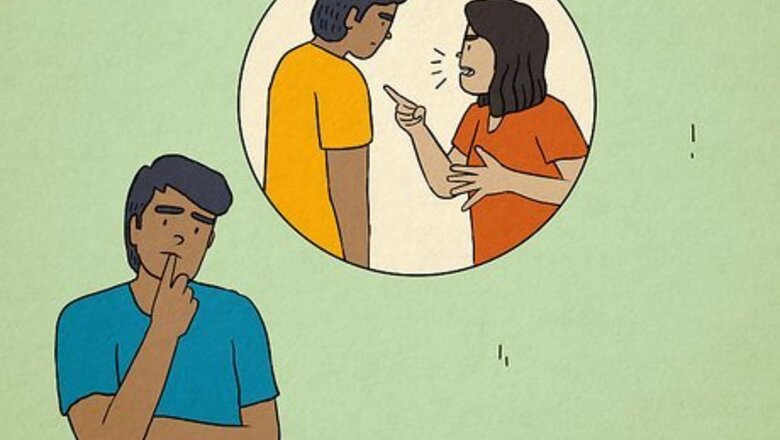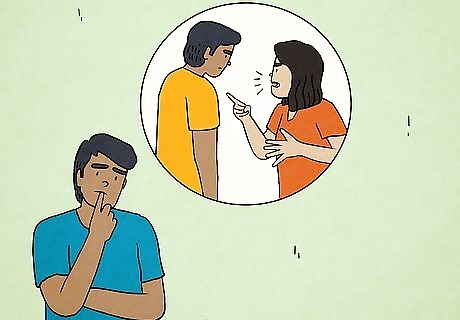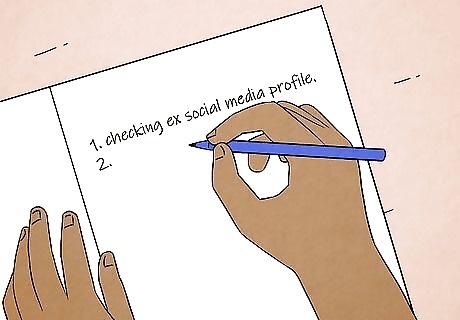
views
- Remove things in your life that remind you of the person you’re thinking about, such as by getting rid of photos or muting them on social media.
- Distract yourself in a healthy way by setting aside time for your hobbies, spending time with friends and family, or focusing on your health.
- Acknowledge your obsessive thoughts when they occur and examine your feelings and surroundings to identify things that may trigger these thoughts.
List out the person’s negative traits.

Focusing on the negatives can help you stay realistic. Obsession can cause you to idealize another person, but making a conscious effort to identify their flaws can help you view them more realistically. This doesn’t mean you need to convince yourself that they’re a horrible person. Rather, this is an exercise that’ll help you view them more as a regular human rather than an idol. For example, point out some habits that your crush does that you don’t particularly like. If you’re obsessing over an ex, remind yourself why your relationship didn’t work out to help yourself think more clearly. Think about the reasons why your obsession is bad or unhealthy for you. Is it affecting your social life, grades, or work performance? Acknowledging these negative effects can motivate you to start changing your behaviors.
Toss pictures or objects that bring them to mind.

Avoid things that remind you of them. Seeing the other person or constantly being reminded of them can make it even more difficult to stop thinking about them. To help yourself get over your obsession, remove anything in your life that may cause you to think of them. Delete photos of them, unfollow them on social media, or even delete their number. For example, if you’re obsessing over your ex, give them back their things and mute them on social media. Do your best to avoid being around that person. However, if your situation makes it so that you still have to see each other often, do your best to maintain distance and not engage with them. Block, unfollow, or mute this person on social media so you won’t be constantly reminded of their existence and tempted to reach out. Reader Poll: We asked 248 wikiHow readers about how they use social media when trying to get over someone, and 50% of them said that they block that person and make their profile private. [Take Poll]
Practice mindfulness.

Focus on the present to ground yourself. When you feel yourself getting lost in your obsessive thoughts, take a deep breath and close your eyes. Listen carefully to the sounds around you and think about all of the other sensations you’re experiencing at that moment. Staying present helps prevent your thoughts from wandering toward the object of your obsession. Practice meditation to help clear your mind of any obsessive thoughts and focus solely on your breathing and the sensations around you. Or, do some deep breathing exercises to help yourself relax and calm your thoughts.
Distract yourself with enjoyable activities.

Focus on your hobbies rather than your obsession. Use your hobbies and fun activities to give yourself a healthy distraction from your obsessive thoughts. Go for a walk, do some crafting, read a book, or even go on a solo trip. Do whatever you need to do to keep that other person out of your mind. It can also help to find a new hobby and dedicate more time to learning something new. For example, try a new sport, start learning a foreign language, or master a new creative hobby like painting for drawing.
Set goals to keep yourself moving forward.

Focusing on accomplishing goals can distract you from an obsession. Setting goals can help you find a new sense of purpose in life that isn’t related to the person you’re obsessing over. Not only that, but accomplishing a task is a great way to cultivate a positive, self-empowering state of mind. Learning to satisfy your own needs through setting goals can make it easier to stop obsessing over someone else. Create SMART goals that are specific, measurable, attainable, relevant, and time-bound. These types of goals will provide you with more actionable steps that’ll make it easier to track your progress. For example: Specific: I’m going to run a half marathon this summer. Measurable: I’ll start training by running a mile every morning for a week, then move it up to 2 miles, 3 miles, and so on over the next 3 months. Attainable: I have lots of time in the morning to go running and also can put my gym membership to use for training. Relevant: I enjoy running as a hobby and already have pretty good endurance. Time-bound: I’ll go running every morning for 3 months to prepare for the marathon.
Meet new people.

Join clubs or groups to make new friends. When you obsess over someone, whether it’s an ex, a crush, or a celebrity, it can be easy to neglect your social life and tell yourself they’re all you need. Break yourself out of these thoughts by making an effort to meet new people and maintain an active social life. For example, volunteer with a local community group, talk to new people at school or work, or have your friends introduce you to their friends. If your obsessive thoughts are directed toward someone like an ex, starting to date again may help take your mind off the other person if you feel ready. Avoid comparing other people to the person you’re obsessing over. Instead, focus on their unique qualities and appreciate them for who they are.
Prioritize yourself and your health.

Eat right, get enough sleep, and relax. It can be easy to neglect your well-being if your thoughts are consumed by an obsession. However, making sure that your body and mind are healthy is key to helping you move on from these obsessive thoughts and live your best life. Focus on yourself and take the time to assess your needs and address the things you may have been neglecting. For your physical health, make sure you’re eating healthy, getting at least 7 hours of quality sleep each night, and doing some physical activity to combat stress. For your mental health, set aside time to do things that relax you and help you feel calm. Go for a walk, read your favorite book, or spend time with friends.
Spend time with people close to you.

Keep your mind occupied by hanging out with friends or family. Allowing yourself to be consumed by an obsession can cause you to neglect the healthy and positive relationships in your life. To help pull yourself out of your obsession, reach out to friends and family and work to nurture those close relationships. Spending time together can also help distract you from your obsessive thoughts. For example, make an effort to call or meet up with your family at least once a week. Or, instead of letting yourself be alone with your thoughts during the weekend, use that time to hang out with friends and do fun activities together.
Confide in others about your obsession.

Open up to friends or family about what you’re going through. Whether you’re obsessing over an ex, a crush, or someone you envy, bottling up your emotions can end up just making matters worse. Confiding in someone could take some weight off of your shoulders and help clear your mind. For example, tell a friend or relative, “I need to get some stuff off of my chest. I like someone, but they don’t feel the same way about me. It makes me so upset I feel sick, and I can’t stop thinking about them.” Don’t be afraid to ask others for advice on what to do. Ask something like, “Have you ever been in this position before? What would you do?”
Identify things that trigger obsessive thoughts.

Take note of situations that lead to obsessive thinking. Whenever you find yourself thinking about the person you’ve been obsessing over, call yourself out. Then, take a moment to analyze your surroundings and situation. Did a certain action or feeling prompt you to think about them? Take note of everything you’re feeling and experiencing in that moment to help identify patterns in your obsessive thinking. For example, you might notice that you start thinking about a crush every time you log onto social media because you’re used to checking on their profile. Or, you might start thinking about your ex every time you pass by a cafe you two used to go to a lot. By identifying your triggers, it’ll be easier to come up with ways to avoid them so that you can keep your thoughts away from that specific person.
Write down your obsessive thoughts.

Writing your thoughts down helps you to better reflect on them. Keep a log of the thoughts you have about the other person and read it over some time later. This can help you better understand and work through your obsessive thoughts, as well as give you something concrete to look back on for the sake of identifying patterns in your thinking. It may help to keep a journal specifically for writing down these thoughts. Ask yourself why you might be obsessing over this specific person. For example, are you attracted to their looks? Are you constantly thinking about an ex and why your relationship didn’t work? Do you think about a celebrity often because you think of them as a friend?
Seek professional help if necessary.

Talk to a therapist for help in changing your thoughts. If you’re having trouble changing your thoughts and behaviors, it might help to talk to a licensed therapist for extra support. A therapist can provide you with a safe environment to talk honestly about your feelings, and they will have exercises and techniques to help you move on from your obsession.




















Comments
0 comment